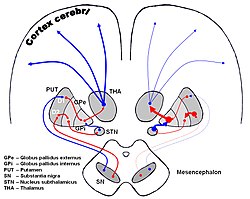|
Thalamic fasciculus
The thalamic fasciculus is a component of the subthalamus (ventral thalamus). It is synonymous with field H1 of Forel. Fibers from the lenticular fasciculus (field H2 of Forel), are joined by fibers from the ansa lenticularis – different parts of the internal globus pallidus, before they enter the ventral anterior nucleus of the thalamus to form the thalamic fasciculus.[1][2] The fasciculus also contains fibers from the cerebellothalamic tract, and the pallidothalamic tract. See alsoReferences
External links
|
||||||||||||||||||||
